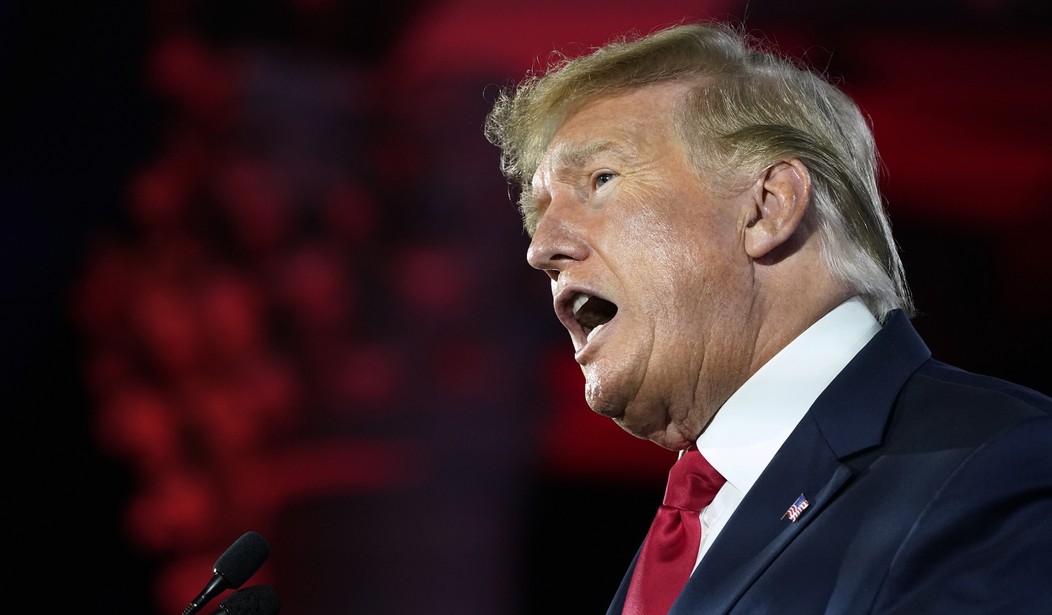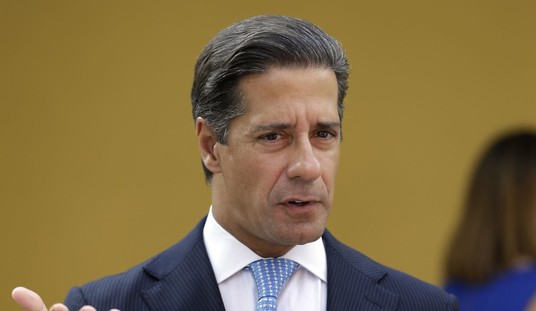So says my friend and colleague Hugh Hewitt, but as he also notes, that’s not sufficient on its own. Hugh argues in today’s Washington Post that Donald Trump can put the onus even further on Attorney General Merrick Garland and the Department of Justice by publishing the search warrant and its specifics under which Monday’s Mar-a-Lago raid took place.
But how much can we learn from just the warrant served on Trump and his staff?
If a sitting president is in some circumstances subject to criminal subpoenas from state officials, a former president can most certainly be subjected to criminal process by federal agents. This has never happened before, but as with all things Trump, the past is no guide to the present.
Still, the American public needs to see the warrant — all of it. The former president has a copy; he should make it public. It likely lists the items to be seized and the laws allegedly violated. The affidavit supporting the warrant is probably sealed, former prosecutors say, and Attorney General Merrick Garland can seek to unseal it.
Citizens need to know whether this a reasonable search based on probable cause of some crime by someone with access to Mar-a-Lago — as a judge has clearly decided there is probable cause to conclude — or yet another unmerited strike at the 45th president by the latest in the long line of former federal officials who have tried to take Donald Trump down a peg, or behind bars, and failed.
The questions are: What is the Justice Department looking for, and was this necessary?
Those certainly are the pertinent questions, but those raise another about this strategy. And that question really is: will the warrant fully answer those initial questions? The warrant itself is hardly the complete presentation of whatever the DoJ might be investigating; it might, in fact, only be a predicate for a search to service an entirely different investigation. Andy McCarthy raised this point yesterday in arguing that this unprecedented action can’t be aimed solely at resolving a document dispute:
The Justice Department obviously used the potential classified information as a pretext to obtain a warrant so it could search for what it is really looking for: evidence that would tie Trump to a Capitol riot offense – either a violent crime, such as seditious conspiracy to forcibly attack a government installation (which is highly unlikely), or a non-violent crime, such as conspiracy to obstruct the January 6 joint session of Congress to count electoral votes, or conspiracy to defraud the government. …
The Biden Justice Department is under enormous pressure from the Democratic base to indict Trump, and it is straining to deliver. But what it is trying to deliver is a Capitol riot case, not a case of mishandling classified documents.
In other words, the search was likely a fishing expedition for their January 6 probe, using alleged violations of the Presidential Records Act and potential violations of statutes restricting the handling and retention of classified material as a predicate. But that predicate would almost certainly be the only issue mentioned in the warrant. Even the warrant application wouldn’t need to go into any greater detail than those alleged violations to justify the search, so unsealing the warrant application may tell us nothing more about what Garland and the DoJ really have in mind either.
Even if that’s the case, though, it still makes sense for Trump to publish the warrant. For one thing, it won’t hurt him to do it at this point, even if it doesn’t tell the whole story or even the correct story. It would demonstrate to observers and especially supporters that Trump doesn’t think he has anything to hide. Conversely, a refusal to publish the warrant will make it look like Trump does think he has something to hide.
More importantly, though, releasing the warrant under these circumstances could put Garland and the DoJ into a difficult position if the warrant was merely a predicate for a different investigation. Having the terms of the original warrant public, assuming that it only uses allegations of document-retention violations, would provide a contrast if the DoJ brought action of an entirely different nature on the basis of what they found. It would expose any diversionary predicate strategy that Garland may have employed here if and when that time came, transforming this raid into a political and legal machination that would seriously undercut the credibility of Garland and the DoJ.
Publishing the warrant now wouldn’t solve all of Trump’s legal woes. It would likely improve his political standing while this process unfolds, however, and that’s the only aspect of this that Trump can control.
Update: Did the FBI leave a copy of the search warrant with Trump’s attorneys on the scene at Mar-a-Lago? It’s not clear, but failure to provide the warrant to the owner of a property being searched or his representatives would be unusual. This CBS News report suggests that Trump and his team have not been given a copy of the warrant:
U.S. officials confirm the search of Trump’s home was approved by the highest levels of the Justice Department. Attorney General Merrick Garland is not expected to make any public statements about the investigation or the search, however.
[Trump attorney Lindsey] Halligan said the search warrant was sealed, and because she had not been party to this aspect of Trump’s legal portfolio until Monday, did not know what kinds of documents the FBI might be looking for nor what kinds of documents the former president keeps with him at Mar-a-Lago.
Nonetheless, she insisted that the government’s search “was an appalling display of abuse and power — complete overkill.” She also asserted that “if they needed documents, they could have asked. There’s never been an issue with compliance.” Halligan said the search came as a “huge surprise.”
Emphasis mine. Eric Trump told the Daily Mail that the FBI refused to give them access to the warrant:
Eric Trump revealed FBI agents refused to hand over the search warrant for their raid on Mar-a-Lago and kicked an attorney off the property in a new, incisive account of the Monday operation at the Florida estate.
Speaking exclusively to DailyMail.com, the former president’s son said the 30 agents who arrived at the property asked staff to turn security cameras off – but they refused.
The bureau, he said, also brought safe crackers in to break into his father’s safe, and he slammed the investigators for rummaging through former first lady Melania’s wardrobe and searching her clothing.
It may be that the attorneys have a copy of it but can’t publish it due to its “sealed” status, or that they weren’t provided a copy at all. That seems highly unusual, and yet another item for suspicion of potential politicization.








Join the conversation as a VIP Member